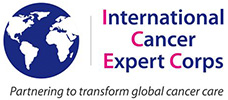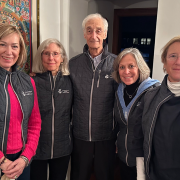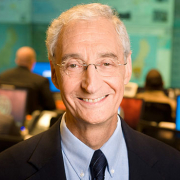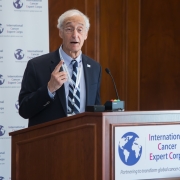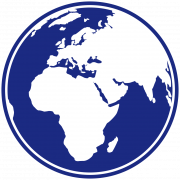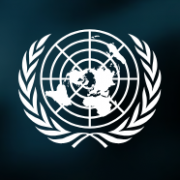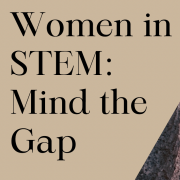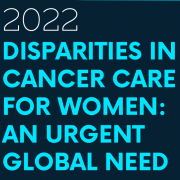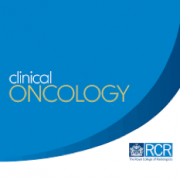C. Norman “Norm” Coleman, MD 1945-2024
/in Articles / PublicationsDear Friends,
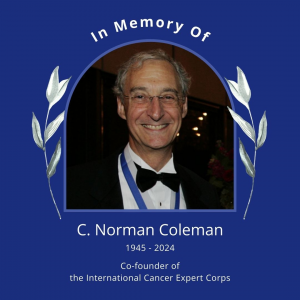 It is with great sadness that we inform the global community of the death of our dear colleague and friend, Dr. C. Norman “Norm” Coleman, who passed away on March 1, 2024. Norm was diagnosed in December 2023 with an aggressive sarcoma. Despite enrolling in an immunotherapy clinical trial at the National Cancer Institute (NCI), his cancer progressed relentlessly. During the subsequent weeks, Dr. Coleman remained engaged and continued to work full-time in his roles as Associate Director of the Radiation Research Program (RRP), as Senior Investigator in the Radiation Oncology Branch (ROB) in the Center for Cancer Research and as leader of his own research laboratory at NIH. Norm continued his work with the International Cancer Expert Corps, an official NIH outside activity for Norm, until mid-February.
It is with great sadness that we inform the global community of the death of our dear colleague and friend, Dr. C. Norman “Norm” Coleman, who passed away on March 1, 2024. Norm was diagnosed in December 2023 with an aggressive sarcoma. Despite enrolling in an immunotherapy clinical trial at the National Cancer Institute (NCI), his cancer progressed relentlessly. During the subsequent weeks, Dr. Coleman remained engaged and continued to work full-time in his roles as Associate Director of the Radiation Research Program (RRP), as Senior Investigator in the Radiation Oncology Branch (ROB) in the Center for Cancer Research and as leader of his own research laboratory at NIH. Norm continued his work with the International Cancer Expert Corps, an official NIH outside activity for Norm, until mid-February.
Recognized worldwide for his numerous scientific achievements and leadership roles, Dr. Coleman also was devoted to addressing health disparities to improve the quality of cancer care globally. These efforts led to Dr. Coleman’s founding in 2013 of the International Cancer Expert Corps (ICEC) , a nonprofit organization that mentors cancer professionals in low- and middle-income countries and in regions with indigenous populations in upper-income countries. Norm, known for his lifelong commitment to mentoring physicians and physician-scientists through their careers, has engaged many of his mentees rewardingly in ICEC’s activities.
Dr. Coleman was an extraordinary man who served admirably his family, his patients, his profession and the institutions for which he has worked. Beyond that he has served well his country and many other parts of the world. Norm’s commitment to serving others, his generosity of spirit and his occasionally disarming wit that made him so endearing will be missed profoundly.
The family will have a private memorial service this week and will hold a larger celebration of life in the upcoming months. One of Norm’s final acts was to give an additional $100,000 donation to ICEC in hopes of providing cancer cures to people in underserved communities around the world. In lieu of flowers, Norm would be grateful for donations to ICEC made in his memory — https://www.iceccancer.org/donate/.
Peace to all,
Nina Wendling, Executive Director, and the ICEC Board of Directors
Barry J. Alperin
Harmar D. Brereton, MD
Nelson Chao, MD, MBA
Manjit Dosanjh, PhD
Silvia C. Formenti, MD
Monique K. Mansoura, PhD, MBA
Donna M. O’Brien, MHA
Daniel C. Petereit, MD
David Andrew Pistenmaa, MD, PhD
Miles Pomper
Lawrence Roth
Timothy Williams, MD, FASTRO
Rebecca Wong, MBChB, FRCPC, MSc
Women in STEM: Mind the Gap. Watch the panel presentation delivered at the Sixty-Sixth Session of the Commission on the Status of Women March 18, 2022
/in Articles / PublicationsWatch Now – Women in STEM: Mind the Gap
Full Program below
Women in STEM Mind the Gap 2022 2Women in STEM: Mind the Gap1
Presented at the CSW66 Forum
18 March 2022, 8:00-9:30am (EST, NY time), 13:00-14:30 (CET, Geneva)
Advancing gender equality and women’s empowerment is critical to achieving the Sustainable Development Goals (SDGs) of the United Nations since a large body of evidence now demonstrates the positive links between gender equality as a fundamental human right and women’s participation in STEM (Science, Technology, Mathematics, Engineering) which improves efficiency in many sectors.
In spite of this, gender imbalance persists worldwide in STEM and ways of bridging this gap need to be understood and implemented. Some key points that have been emphasised is that encouragement of girls should start with the involvement of family in setting the right environment for both sons and daughters as well as the great need for women role models, improved recognition (in images and media) and perception of women in these fields as well as the necessity for mentorship.
All avenues need to be exploited to minimise and bridge the gap if women are to contribute and profit equally from the potential of science and technology and participate meaningfully in a global knowledge society, to keep families out of poverty and provide educational benefits to the next generation.
STEM is necessary to fight diseases, fight and respond to the challenges of global health, environment and climate change. During the COVID-19 pandemic, ICT technologies have come into their own by allowing communication, education and collaboration both remotely and globally, not only giving voice to all but also actively participating in discussion such as this panel and allowing all perspectives to be heard and outlining challenges as well as proposing solutions which are effective locally. Showing clearly both the empowering role of information and communication technologies (ICT) but also the negative side of how it can be disempowering if you lack the know-how and the tools and infrastructure. Once again women have been much more affected and impacted.
Society would benefit on multiple levels if we had more women in STEM since they can not only improve the world’s economy but also give science a perspective that men do not have. Research shows that companies in the top 25th percentile for gender diversity on their executive teams were 21% more likely to experience above-average profits.
There are several reasons for the lack of women in STEM. Multiple sociocultural barriers prevent many high school girls from fully participating in STEM and ICT career tracks leading to careers. These barriers include limited exposure to female STEM role models; stereotypes around girls’ lack of STEM ability and interest; commonly held misperceptions about STEM fields being “unfeminine;” low STEM self-esteem (negative or neutral STEM identity); lack of knowledge and/or misunderstanding of STEM fields; and a disproportionate (and thus intimidating and/or unwelcoming) number of male students and educators in STEM and ICT classes. These barriers need to be addressed to encourage more women to enter into in STEM to address global challenges.
Objective: Our STEM panel will highlight the empowering role of information and communication technologies (ICT) and the importance of girls and women having the knowledge, tools and infrastructure they need to be successful in STEM careers. Society would benefit on multiple levels if we had more women in STEM to improve the world’s economy and their involvement gives science a diverse perspective that men do not have.
Panel Moderators: Afton Beutler-Reed (AHP &MLP) and Manjit Dosanjh (ICEC)
Rapporteur: Petya Georgieva (SEEIIST)
Afton Beutler-Reed is the International Vice President Mothers Legacy Project http://motherslegacy.org/ and Director – GEO program Global Education Opportunity Program. Since 2003, she has been a UN representative in New York and Geneva. Seeing the unique international and cultural environment in Geneva, Afton created and directs the Global Education Opportunity (GEO) program to bring students to attend UN meetings and international events; do research and contribute to global initiatives as well as participate in grassroots community projects
Petya Georgieva is a Communication Officer for South East European International Institute for Sustainable Technologies (SEEIIST) and has worked closely with Manjit for many years on ENLIGHT Highlights. She is a Digital Communications Content Creator, Website and data platform manager, Conference and workshop planning expert.
Panelists:
Katherine Coffman
Piramal Associate Professor of Business Administration
Harvard Business School
“Gender Gaps in Who Puts Themselves Forward – And How to Close Them”
Professor Coffman studies the sources of gender gaps in economically-important contexts. Her work focuses on the role of beliefs: how do stereotypes bias the beliefs that individuals hold about themselves (and others), and how do these biased beliefs shape decision-making? Through careful experimental design, she aims to isolate the forces that underlie important field phenomena, to quantify the impact of these forces on the efficiency and equity of outcomes, and to test a variety of potential policy interventions. Her work provides insights for leaders and policymakers looking to design more equitable, and efficient, processes for evaluating, recruiting, and promoting talent. She holds a PhD in economics from Harvard University and a BA in mathematics and economics from Williams College.
Manjit Dosanjh: is the Project Leader for STELLA (Smart Technologies to Extend Lives with Linear Accelerators), honorary CERN Staff, the particle physics laboratory in Geneva, Switzerland and Visiting Professor at the University of Oxford. She is also actively involved in helping non-profit science and technology education gender related organisations in Geneva and board of director for ICEC (International Cancer Expert Corps).
ICEC: The International Cancer Expert Corps (ICEC), an ECOSOC accredited NGO that strives to reduce mortality and improve the quality of life for people with cancer in low- and middle-income countries, as well as the indigenous and geographically underserved populations in upper-income countries and regions worldwide. The ICEC addresses this mission through a mentoring network of cancer professionals who work with local and regional in-country groups to develop and sustain expertise for better cancer care and by addressing technology and other barriers to access to care.
Eva Gousiou (CERN WIT), Electronics Engineer, Beams Department, CERN Eva is an electronics engineer and joined CERN in 2005, where she has held several positions as electronics developer, accelerator coordinator and facilitator in collaboration initiatives across departments. She is an open hardware enthusiast. Eva is part of the CERN WIT community since 2019 and is an active contributor to advocacy and networking activities.
egousiou@cern.ch | @evoulitas
WIT (Women in Technology)
CERN is the European Laboratory for Particle Physics in Geneva, Switzerland. It hosts 15’000 people, most of whom are physicists and engineers. The Women in Technology (WIT) at CERN is a grass-roots community with more than 500 members that started in 2016 with the aim of raising awareness on gender issues in the Organisation, connecting people interested in equal opportunities, providing mentoring and support and showcasing female role models in outreach activities, to inspire current and future generations. https://wit-hub.web.cern.ch
Laetitia van Haren: Cultural Anthropologist, President-founder of SAHFA – Smart Access to Health for All- through customised mobile communication technologies. Inventor-promotor of JamboMama! – smartly connecting mothers to health providers. Implementation and App development activities directed at women and rural communities in Tanzania and Congo.
Safe Motherhood: This is a fundamental women’s right since childbearing needs to be safer especially in remote areas far from modern medical facilities. Expectant mothers need to be empowered with the knowledge and means to manage her health and well-being during pregnancy. With this innovative smartphone application- a digital technology STEM solution, the process of birth can be improved and save the lives of mothers.
Rita Karl is the Senior Managing Senior Director of the STEM Media & Education Department at Twin Cities PBS and Executive Producer of the PBS award-winning SciGirls program, drawing on cutting-edge research on what engages girls in STEM. In 2019 and 2020, SciGirls was nominated for an Emmy Award for Best Educational Series and in 2021 won a Gracie Award for Best Family TV show – National. Ms. Karl previously served as Director of Education at the Challenger Center for Space Science Education, as Director of USAID’s award-winning Educational Technology in Schools in Egypt, and the NASA award-winning Texas Aerospace Scholars engineering education program for high school students, now in its 20th year.
About SciGirls: SciGirls has a robust presence on PBSKids.org with STEM-themed games and videos for children. Through its national outreach program, SciGirls CONNECT, SciGirls Trainers have trained 5,300 STEM educators in the U.S. in gender equitable and culturally responsive instructional strategies. Two new seasons SciGirls in the National Parks and SciGirls in Space are in production with funding from the National Science Foundation (NSF) and NASA. A new NSF grant, Black SciGirls is studying how educators who use anti-racist practices and Black women role models to engage more Black girls in STEM.
SciGirlsConnect.org | pbskids.org/SciGirls | pbslearningmedia.org/SciGirls
Facebook: @scigirlstv | Twitter: @scigirls | Instagram: @scigirls
Disparities in Cancer Care for Women: An Urgent Global Need. A panel presentation to be given at the Committee for the Status of Women Forum, Recorded Presentation – March 16, 2022
/in Articles / PublicationsWatch the recorded presentation at this link
https://youtu.be/UquSTyoia4g
Disparities in Cancer Care for Women: An Urgent Global Need
Disparities in cancer care 2022
Recorded for the CSW66 Forum,
16 March 2022, 8:00-9:30am (EDT time)
Panel Moderator: Donna O’Brien, ICEC, Strategic Visions in Healthcare, New York
Panelists:
Manjit Dosanjh, ICEC, University of Oxford and CERN
Silvia Formenti, Weill Cornell Medical Center, New York Presbyterian Hospital, New York
Surbhi Grover, University of Pennsylvania and Gynaecological cancer clinic director and Oncology Consultant at Princess Marina Hospital, Gaborone, Botswana
Daniel Petereit, Monument Health Cancer Care Institute in Rapid City, South Dakota, and Director of Disparity Research at the Avera Cancer Care Institute in Sioux Falls, South Dakota, Director of American Indian “Walking Forward” Program
Rohini Batia, Johns Hopkins, PGY-3 in Radiation Oncology
When it is detected early and treated effectively, cervical cancer—the fourth most common cancer in women—is one of the most highly curable cancers. In the United States (U.S.), the rate of infection and death from cervical cancer has decreased significantly in the past 40 years, due to increased screening, including for the human papillomavirus (HPV), which causes the cancer; the HPV vaccine; and access to radiation therapy—which is the foundation for curative treatment for advanced cancers.
In low- and middle-income countries (LMICs), where access to radiation therapy is scarce or non-existent, the story is starkly different. For a young woman in Tanzania or Ethiopia, for example, a diagnosis of cervical cancer is likely to be a death sentence. Left untreated, she will suffer a long and painful illness. She can lose bladder and bowel function and be ostracized from her family and community—sent away to die alone.
The impact of her death is devastating in other ways: since cervical cancer is most often diagnosed in women under 50, children of these women are often left as orphans and neglected resulting in additional needless suffering and deaths. In LMICs, successfully treated breast cancer also depends on the availability of radiation therapy. The BBC reported last summer from Zimbabwe on 44-year-old Tendayi, who began a course of radiation therapy after undergoing breast-conserving surgery and chemotherapy for stage III breast cancer. When the radiation therapy machine broke down, she was told the only way it could be fixed was to fly in an engineer from South Africa which can take months. Without timely radiation treatment, her oncologist told her that she should start thinking about having a mastectomy as her only remaining option.
Unfortunately, Tendayi’s story is all too common among women in LMICs where radiation therapy technology breakdowns and long servicing delays are the norm or where it is not available at all. The lack of access to cancer care contributes to staggering outcomes, with nine of 10 cervical cancer deaths and seven of 10 breast cancer deaths occurring in LMICs. Overall, LMICs bear the burden of 70 percent of cancer deaths.
With more than 18 million new diagnoses of cancer worldwide in 2018 and more than nine million cancer deaths, and with new cancer cases expected to reach 27 million by 2040, the need to improve access to treatment, especially radiation therapy, that can extend and save millions of lives has never been more critical.
Donna O’Brien, MHA
Donna O’Brien is President of Strategic Visions in Healthcare, LLC, a healthcare consulting firm specializing in healthcare strategy, population health, cancer program and translational research program expansion, and facilitation of strategic partnerships. Building upon her extensive healthcare management experience she launched this firm in 2005. Strategic Visions has clients across the U.S. including health systems, academic medical centers, research institutes, and government. She is a member of the Board of Directors of the International Cancer Expert Corps.
Manjit Dosanjh, PhD
Dr Dosanjh has had a long career at CERN where she served as Director of Medical Applications and played a key role in launching the ENLIGHT (European Network for Light Ion Hadron Therapy). She has a PhD in Biology is on the faculty of the University of Oxford and she has served as a mentor and advisor for many students from across the globe. Her work has included many initiatives to expand access to care for those in Low Middle-Income Countries and for advancing career opportunities for women in science. She is a member of the Board of Directors of the International Cancer Expert Corps and project leader of STELLA.
Silvia Formenti, MD
Dr Formenti is the Chair of Radiation Oncology at Weill Cornell Medical College/Weill Cornell Medical Center. She is a recognized leader in breast cancer research and her groundbreaking work has transformed the paradigm in radiation biology, demonstrating the efficacy of combining radiotherapy with immunotherapy to control cancer cell growth in solid tumors. She has been a champion of efforts to improve access to care for underserved populations and her research includes studying the impact of cancer in women in LMICs on families. She is a member of the Board of Directors of the International Cancer Expert Corps.
Surbhi Grover, MD, MPH
Dr Grover is a Radiation Oncologist at the University of Pennsylvania’s Abramson Cancer Center. Her research interests include racial and ethnic disparities in cancer care and outcomes, HIV-related malignancies, implementation and up-scaling of prevention and treatment programs in low resource settings. Since 2011 she has been engaged with the UPENN Botswana partnership and is currently serving as Gynaecological cancer clinic director and Oncology Consultant at the Princess Marina Hospital in Botswana.
Daniel Petereit, MD, FASTRO
Dr Petereit is a Radiation Oncologist at Monument Health in Rapid City South Dakota. He is the founding Director of the NCI-funding “Walking Forward” Program in South Dakota which serves the American Indian population on reservations in South Dakota. He has served as President of the American Brachytherapy Society and championed global health programs. He is a member of the Board of Directors of the International Cancer Expert Corps.
Rohini Batia, MD
Rohini is currently a PGY-3 resident in Radiation Oncology at Johns Hopkins University. She is interested in working to mitigate disparities in access to quality oncologic care in resource-limited settings. She graduated with a degree in Epidemiology from the University of Rochester and was a Fulbright-Nehru Scholar in Delhi where she investigated predictors of tobacco use among women. She has worked with Dr. Surbhi Grover since 2015 on a variety of projects, including quantifying delays along the patient care continuum in oncology. She has worked with the multidisciplinary women’s clinic in Gaborone helping to pilot test a new smartphone application and refine clinic workflow and is currently working on understanding the uptake of hypofractionationed radiation therapy in low resource settings.
Surveying the Challenges to Improve Linear Accelerator-based Radiation Therapy in Africa: a Unique Collaborative Platform of All 28 African Countries Offering Such Treatment
/in Articles / PublicationsRadiation therapy is a critical component for curative and palliative treatment of cancer and is used in more than half of all patients with cancer. Yet there is a global shortage of access to this treatment, especially in Sub-Saharan Africa, where there is a shortage of technical staff as well as equipment. Linear accelerators (LINACs) offer state-of-the-art treatment, but this technology is expensive to acquire, operate, and service, especially for low- and middle-income countries(LMICs), and often their harsh environment negatively affects the performance of LINACs, causing downtime.
A global initiative was launched in 2016 by ICEC and CERN to address the technology and system barriers to providing radiation therapy in LMICs through the development of a novel LINAC-based radiation therapy system designed for their challenging environments. As the LINAC prototype design phase progressed, it was recognized that additional information was needed from LMICs on the performance of LINAC components, on variables that may influence machine performance and their association, if any, with equipment downtime. Thus, a survey was developed to collect these data from all countries in Africa that have LINAC-based radiation therapy facilities. In order to understand the extent to which these performance factors are the same or different in high-income countries, facilities in Canada, Switzerland, the UK, and the USA were invited to participate in the survey, as was Jordan, a middle-income country. Throughout this process, LMIC representatives have provided input on technology challenges in their respective countries. Read more…

